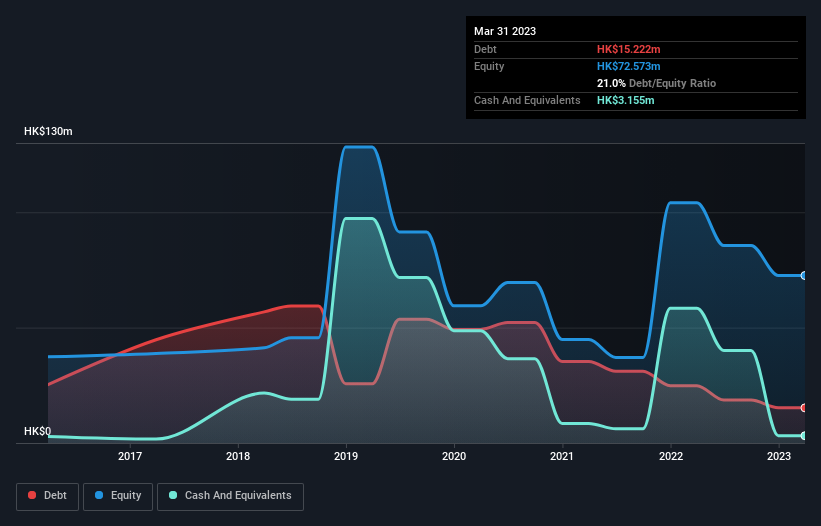David Iben put it well when he said, 'Volatility is not a risk we care about. What we care about is avoiding the permanent loss of capital.' When we think about how risky a company is, we always like to look at its use of debt, since debt overload can lead to ruin. We note that KNT Holdings Limited (HKG:1025) does have debt on its balance sheet. But is this debt a concern to shareholders?
When Is Debt Dangerous?
Debt and other liabilities become risky for a business when it cannot easily fulfill those obligations, either with free cash flow or by raising capital at an attractive price. Part and parcel of capitalism is the process of 'creative destruction' where failed businesses are mercilessly liquidated by their bankers. While that is not too common, we often do see indebted companies permanently diluting shareholders because lenders force them to raise capital at a distressed price. By replacing dilution, though, debt can be an extremely good tool for businesses that need capital to invest in growth at high rates of return. When we think about a company's use of debt, we first look at cash and debt together.
Check out our latest analysis for KNT Holdings
What Is KNT Holdings's Debt?
The image below, which you can click on for greater detail, shows that KNT Holdings had debt of HK$15.2m at the end of March 2023, a reduction from HK$24.8m over a year. However, it does have HK$3.16m in cash offsetting this, leading to net debt of about HK$12.1m.

A Look At KNT Holdings' Liabilities
The latest balance sheet data shows that KNT Holdings had liabilities of HK$36.0m due within a year, and liabilities of HK$5.53m falling due after that. Offsetting these obligations, it had cash of HK$3.16m as well as receivables valued at HK$22.6m due within 12 months. So its liabilities outweigh the sum of its cash and (near-term) receivables by HK$15.8m.
Of course, KNT Holdings has a market capitalization of HK$400.2m, so these liabilities are probably manageable. However, we do think it is worth keeping an eye on its balance sheet strength, as it may change over time. The balance sheet is clearly the area to focus on when you are analysing debt. But it is KNT Holdings's earnings that will influence how the balance sheet holds up in the future. So when considering debt, it's definitely worth looking at the earnings trend. Click here for an interactive snapshot.
Over 12 months, KNT Holdings made a loss at the EBIT level, and saw its revenue drop to HK$72m, which is a fall of 10%. We would much prefer see growth.
Caveat Emptor
While KNT Holdings's falling revenue is about as heartwarming as a wet blanket, arguably its earnings before interest and tax (EBIT) loss is even less appealing. To be specific the EBIT loss came in at HK$25m. When we look at that and recall the liabilities on its balance sheet, relative to cash, it seems unwise to us for the company to have any debt. Quite frankly we think the balance sheet is far from match-fit, although it could be improved with time. However, it doesn't help that it burned through HK$52m of cash over the last year. So in short it's a really risky stock. There's no doubt that we learn most about debt from the balance sheet. However, not all investment risk resides within the balance sheet - far from it. To that end, you should learn about the 3 warning signs we've spotted with KNT Holdings (including 2 which are potentially serious) .
If, after all that, you're more interested in a fast growing company with a rock-solid balance sheet, then check out our list of net cash growth stocks without delay.
Valuation is complex, but we're here to simplify it.
Discover if KNT Holdings might be undervalued or overvalued with our detailed analysis, featuring fair value estimates, potential risks, dividends, insider trades, and its financial condition.
Access Free AnalysisHave feedback on this article? Concerned about the content? Get in touch with us directly. Alternatively, email editorial-team (at) simplywallst.com.
This article by Simply Wall St is general in nature. We provide commentary based on historical data and analyst forecasts only using an unbiased methodology and our articles are not intended to be financial advice. It does not constitute a recommendation to buy or sell any stock, and does not take account of your objectives, or your financial situation. We aim to bring you long-term focused analysis driven by fundamental data. Note that our analysis may not factor in the latest price-sensitive company announcements or qualitative material. Simply Wall St has no position in any stocks mentioned.
About SEHK:1025
KNT Holdings
An investment holding company, manufactures, retails, and trades in garments in the United States, Hong Kong, Europe, Australia, and the United Kingdom.
Adequate balance sheet with very low risk.
Market Insights
Community Narratives



